Recovery Washington
A Campaign to Reduce Opioid Overdoses
Republicans played a leading role in 2024 in efforts to combat the scourge of fentanyl. The Recovery Washington package, introduced by Senate Republicans, aimed to prevent overdoses, coordinate state efforts to promote treatment and recovery, and restore funding for multijurisdictional law enforcement task forces. Several proposals emerged in the final budget deal; others remain for consideration in future sessions.
Washington is among states hardest hit by the national explosion in fentanyl usage, a leading factor in the 2,700 overdose deaths reported statewide in 2022. The opioid arrived on the scene a decade ago and quickly supplanted heroin and prescription medications as the street drug of choice. Fentanyl is the active ingredient in most pills sold illicitly, and because strength is unregulated, a single pill can contain a fatal dose. Yet most users do not recognize the danger because pills are produced in presses that mimic the appearance of prescription drugs. Recent news reports indicate pills are being sold for as little as four-for-a-dollar in Portland and some Washington cities.
Proposals adopted this year include a statewide drug overdose prevention and education campaign, funding for tribal drug programs, and restoration of state support for law enforcement drug task forces covering multiple jurisdictions. Republicans also proposed measures to ensure addicts report for court-ordered treatment, and impose criminal penalties for the exposure of children to fentanyl.
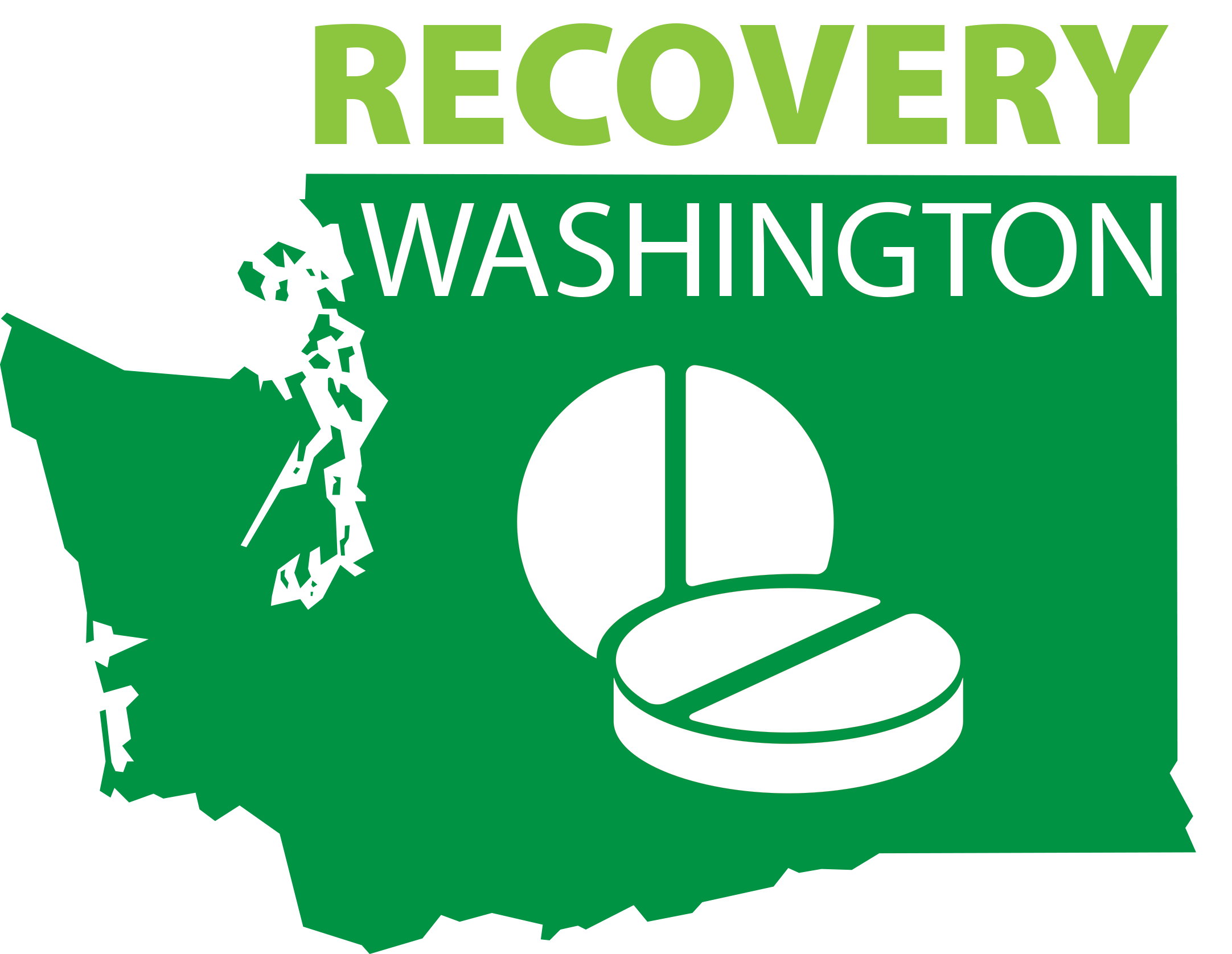
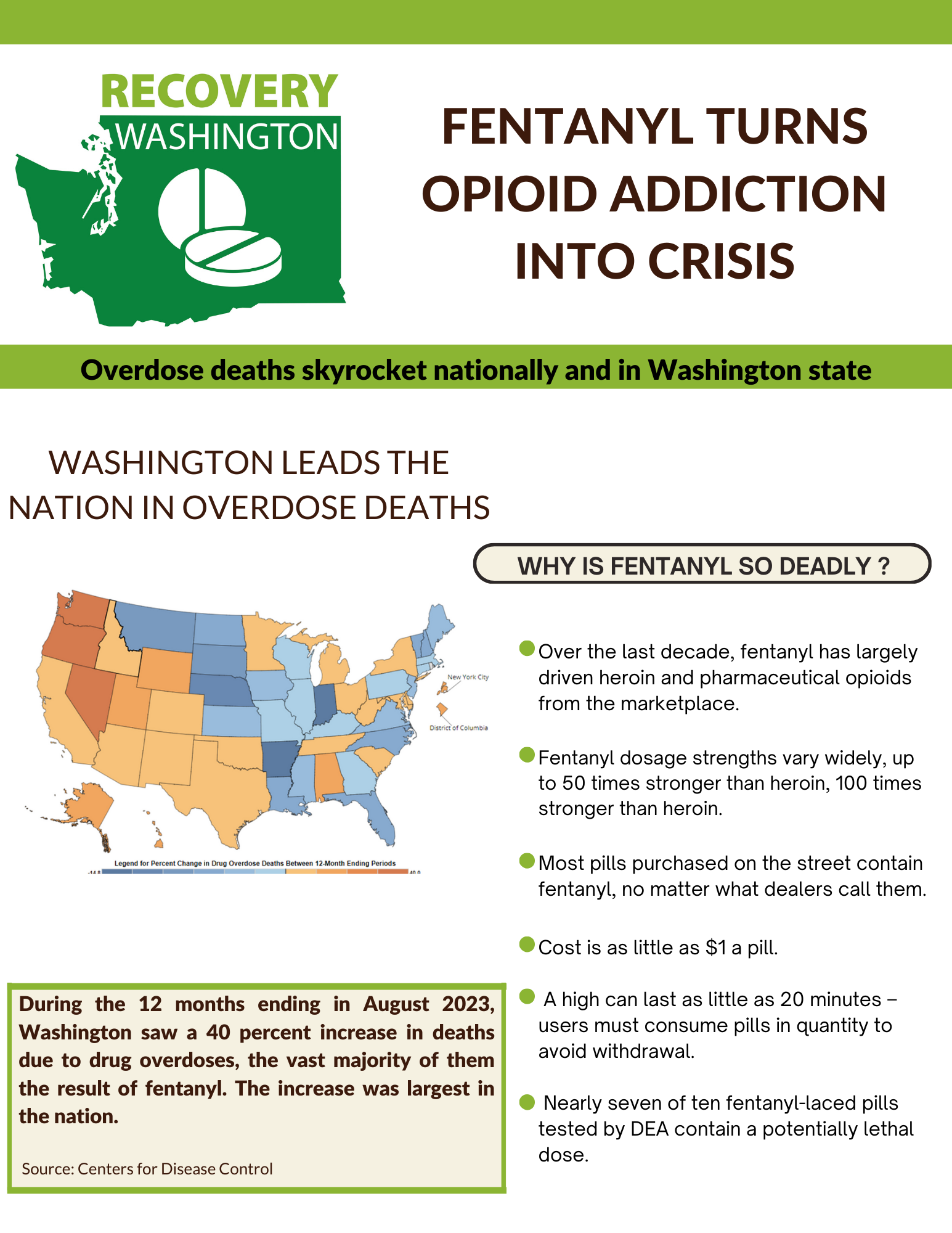
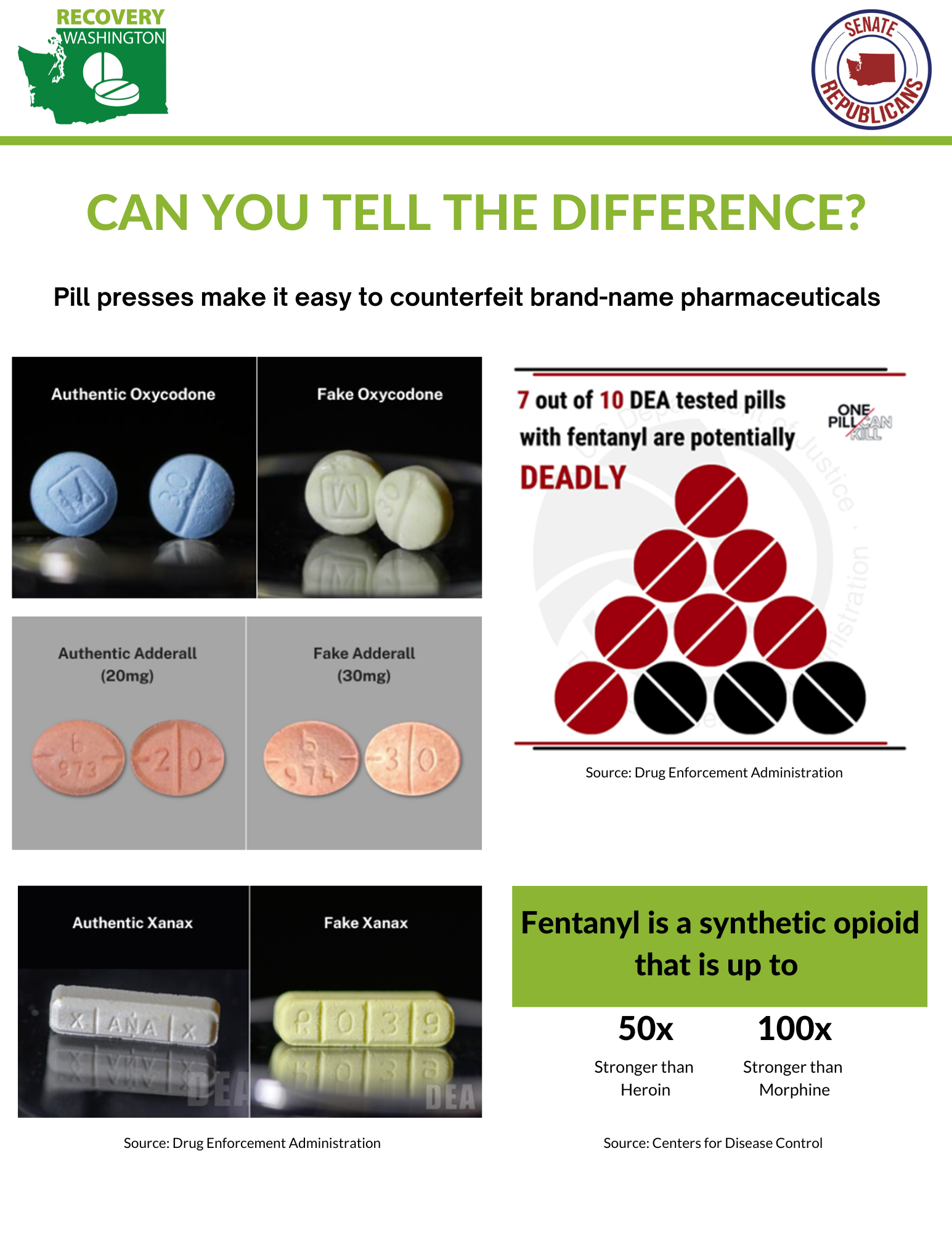
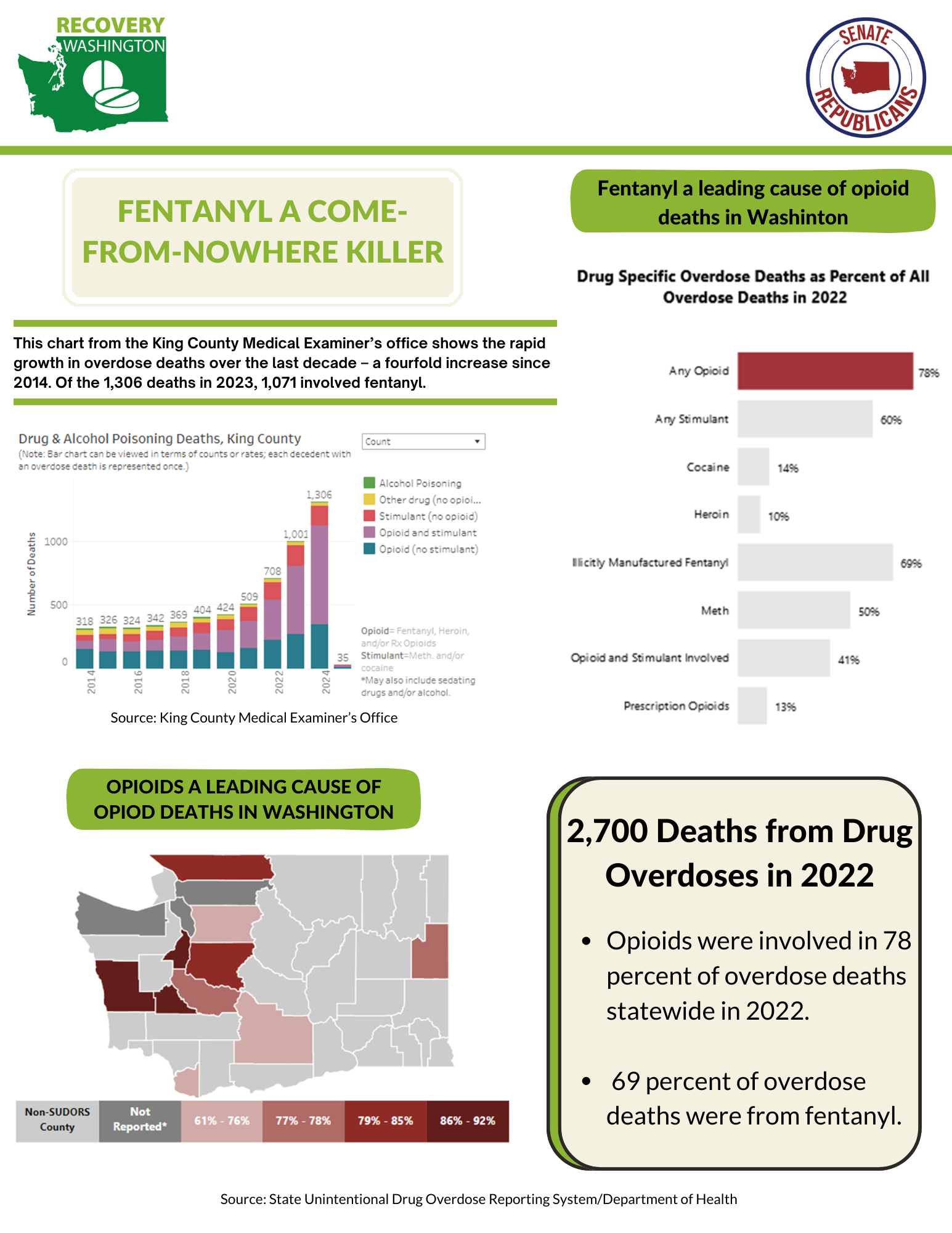
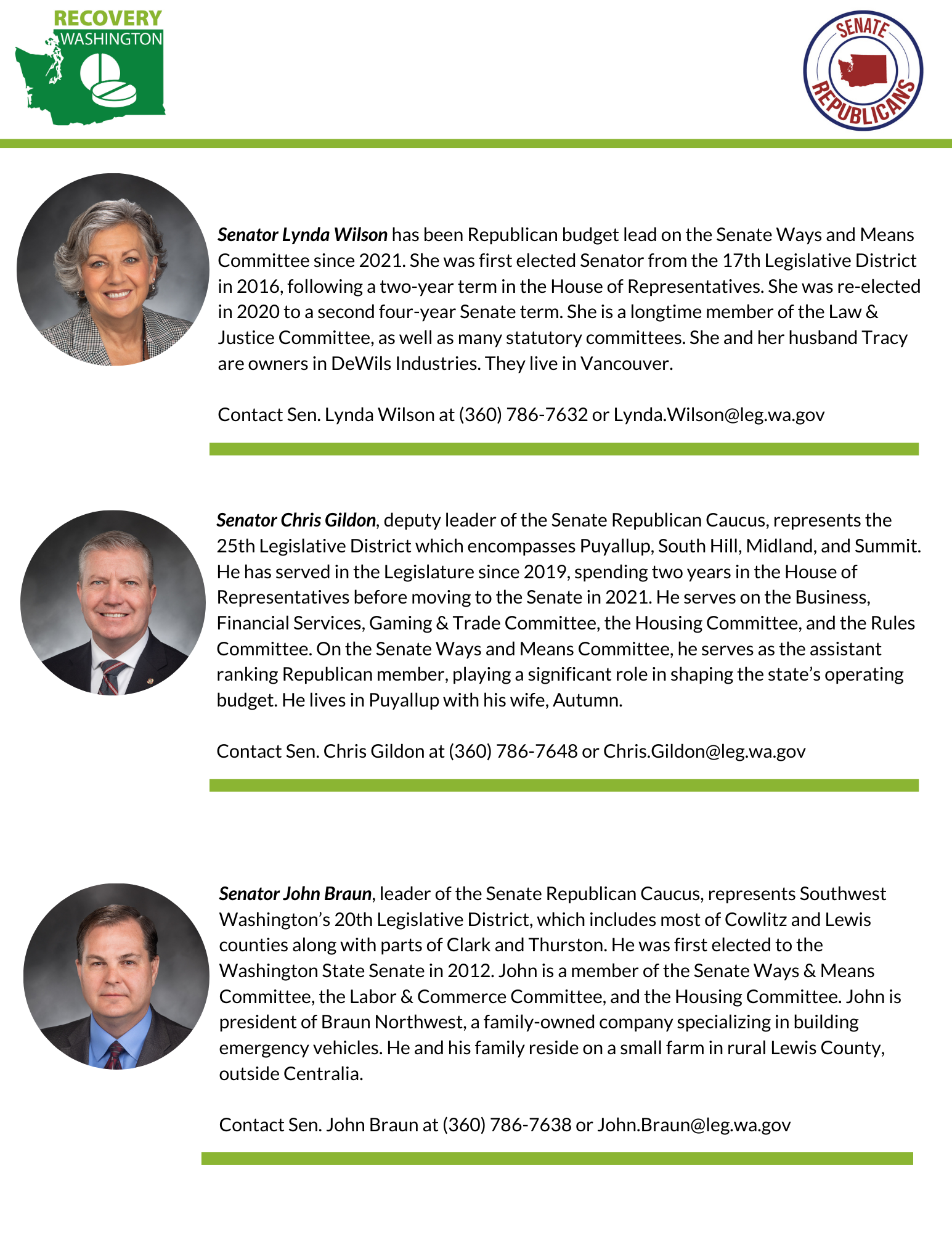
News Releases
Senators mystified by cut in drug task force funding; lawmakers approve other Republican fentanyl proposals
Two bills in Republican Recovery Washington package are sent to governor’s desk
OLYMPIA – Two Republican bills addressing Washington’s fentanyl crisis are headed to the governor’s office for final consideration, but senators say they are surprised by a cutback in this year’s budget for local law enforcement drug task forces.
Senate Republicans offered proposals this year to combat the spread of deadly fentanyl this year in their Recovery Washington package, directing state resources at treatment, recovery and prevention.
They succeeded in passing proposals that would launch a statewide public-information program and fund tribal programs to reduce opioid abuse. Yet the final budget deal, passed Thursday as the Washington Legislature prepared to adjourn its 2024 session, cuts funding for multi-agency drug task forces to combat drug trafficking and local distribution networks.
Sen. Chris Gildon, R-Puyallup, introduced legislation to increase funding for law enforcement task forces from $4.2 million last year to $7 million. But the final budget deal, written by majority Democrats in the Legislature, cuts funding to $2.7 million.
“If the Legislature wants to get serious about ending the opioid addiction problem, it ought to be increasing funding for law enforcement, rather than cutting drug task forces back to a paltry $2.7 million,” Gildon said. “I would support spending $100 million to get these deadly drugs off the street. The epidemic is that serious.”
Since 2005, the state has earmarked Department of Justice funding for the local law enforcement programs, which have amassed a strong track record of intercepting drug shipments, including fentanyl. Last summer, the administration of Democratic Gov. Jay Inslee announced plans to spend the federal money on other programs, prompting members of Congress from Washington state to write a letter of protest.
Recovery Washington proposals that survived final votes in the Legislature included Sen. Lynda Wilson’s SB 5906, which creates a public information campaign aimed at youth and adults. Her “One Pill Kills” campaign would be managed by the Department of Health. It would underscore the point that most pills sold illicitly on the street use fentanyl as their active ingredient, even though they take the form of pharmaceutical opioids. Because dosages are uncontrolled, in too many cases a single pill contains a fatal dose.
“The value of this bill should be apparent to anyone who has a news story about parents grieving the loss of a teenager or young adult who died because of one pill,” said Wilson, R-Vancouver. “We can wonder all day why young people seem unaware of fentanyl’s dangers, but the bottom line is, too many of them are unaware.”
The final budget deal also provides funding for a bill from Senate Republican Leader John Braun for tribal programs to combat fentanyl and synthetic opioid abuse. SB 6099 earmarks at least 20 percent of state opioid settlement funds for Native American tribal programs. Funding comes from Washington’s share of a national settlement with opioid manufacturers.
“This is an important bill, given that every corner of our state is affected by the growing opioid-abuse crisis,” Braun said. “Our Native American tribes are disproportionately affected, and they have taken a proactive approach to treatment that deserves support. I’m glad that the Legislature is providing additional funding for their work.”
The final budget deal provides $15.4 million to tribes and urban Indian health programs directly from opioid settlement funds, and earmarks other money for specific programs, such as a tribal fentanyl summit. Braun notes that tribal treatment and recovery programs typically extend services to non-tribal members and provide an important resource within their communities.
Federal statistics released last month indicate that Washington has been hard hit in the explosion of fentanyl usage nationwide. Washington had the biggest year-over-year increase in deaths due to overdoses during the 12 months preceding September, the vast majority due to fentanyl. Overdose fatalities increased by more than 1,000, from 2,483 to 3,511.
Senate passes bills to tackle opioid addiction, overdose deaths
Bills launch education program, fund tribal recovery efforts — key elements in Senate Republicans’ ‘Recovery Washington’ package
OLYMPIA – Washington state’s fast-rising rate of opioid addiction and overdose deaths are targeted by a pair of bills that emerged from the state Senate this week. Both measures passed the Senate 49-0 and now move to the House.
The bills launch a coordinated statewide education program aimed at youths and adults, and fund tribal efforts for prevention, recovery and treatment. They are part of the ‘Recovery Washington’ package advanced by Senate Republicans this year to coordinate state efforts to promote drug treatment and prevent drug overdoses. Washington state leads the nation in the growth of overdose deaths, according to the latest federal figures – a 40 percent increase in the 12 months preceding August. Some 2,700 deaths were recorded in 2022.
Senate Bill 5906, sponsored by Sen. Lynda Wilson, R-Vancouver, launches a public awareness campaign under the direction of the state Department of Health. The campaign would provide information about the dangers of methamphetamines and opioids, with emphasis on fentanyl. It also would provide information about drug addiction, treatment programs, and state laws providing immunity for those who seek assistance in overdose cases.
Wilson said many teenagers fail to recognize that most pills available through illicit channels use fentanyl as their active ingredient – which can be deadly even in small doses. “They don’t realize the pills they are ordering on the Internet are laced with fentanyl,” she said. “We need to educate kids that one pill can kill.”
SB 6099, sponsored by Senate Republican Leader John Braun, R-Centralia, recognizes that Washington tribes are the hardest hit of any racial or ethnic population in the state. Overdose deaths are double the rate of the next-closest group, Braun said in remarks on the Senate floor. For comparison, he noted that West Virginia ranks first among states in overdose deaths per capita, but the death rate among Washington tribal members is 50 percent higher.
“Tribes aren’t standing still on this problem,” Braun said. “Several tribes have built or are building substance use disorder treatment facilities, often providing treatment service to both tribal members and to community members, but this is a big problem in our state, and we should lend a hand. This is a way to give them the resources they need to be successful.”
Braun’s measure creates the Tribal Opioid Prevention and Treatment Account and funds it with money the state will receive from a national opioid settlement with drug manufacturers and distributors. Tribes would receive approximately 20 percent of the settlement money the state expects to receive over the next 17 years. The money would be earmarked for tribal programs to combat opioids, including prevention and recovery services, educational campaigns and support for first responders.
Fentanyl education bill passes Senate committee as pills fall to 25 cents in Portland
Declaration of emergency in Oregon underscores need for ‘Recovery Washington’ proposals
OLYMPIA – A bill launching a public education campaign to prevent drug overdoses cleared the Senate Ways and Means Committee before a key deadline Monday for passage of bills in the 2024 legislative session.
Other elements of the ‘Recovery Washington’ package announced by Senate Republicans did not advance, but lawmakers said growing alarm in Oregon could help light a fire under the Washington Legislature before it adjourns March 7. Monday was the deadline for policy bills to pass fiscal committees in the Washington House and Senate.
Oregon officials last week declared a formal state of emergency in Portland and surrounding Multnomah County, to better coordinate opioid treatment and recovery programs. A news report Monday indicated that the price of fentanyl-laden pills on the streets of Portland has dropped as low as 25 cents apiece.
Meanwhile, Washington also is seeing record deaths from drug overdoses – 2,700 in 2022, the most recent annual numbers available. According to the latest federal figures, Washington had the fastest growing death toll in the nation, a 40 percent increase in the 12 months preceding August.
“A crisis like this one doesn’t stop at the state border,” said Sen. Chris Gildon, R-Puyallup. “When fentanyl pills are selling four-for-a-dollar in Portland, we are in deep trouble in Washington state.
“I think the news from Oregon ought to be a wake-up call for the Washington Legislature. Things are getting worse, and it’s happening fast. Republicans and Democrats came to Olympia this year with good ideas, and even if our bills did not survive, we still have a chance to revive proposals in our budget before this session ends. If we make the fight against fentanyl a top priority, we can still make a difference.”
Senate Bill 5906, sponsored by Sen. Lynda Wilson, R-Vancouver, creates a statewide drug overdose prevention and education campaign.
“By now most of us have read or seen a news report about a parent grieving the loss of a child who died from taking a pill, not knowing it contained fentanyl,” Wilson said. “Although many lives have been saved with anti-overdose drugs like naloxone, it would be far better for our young people to be aware that one pill is enough to kill them. Saying no to a pill of unknown origin in the first place means their futures may not have to depend on being revived.”
Another Recovery Washington proposal passed committee last week. SB 6099, sponsored by Senate Republican Leader John Braun, earmarks a 20 percent share of state opioid settlement funds for tribal governments, which have been hit especially hard by the opioid crisis.
Other proposals remain candidates for revival before the session ends. Gildon’s SB 6134 would have restored full funding for multi-agency law-enforcement drug task forces that intercept drug shipments and bust drug dealers at the local level. Gov. Jay Inslee’s proposal cuts task force funding from about $4.2 million in the current fiscal year to $2.7 million. The measure also would have refocused state planning efforts to combat the crisis.
Another Gildon measure, SB 6297, would have given courts tighter control over pre-trial diversion programs, ensuring addicts enter and complete drug treatment programs.
“The fentanyl epidemic is spreading,” said Braun, R-Centralia. “Oregon has declared a fentanyl emergency, but it’s not alone in this crisis. If pills can be bought on the streets of Portland for 25 cents each, I am sure the same thing can be said about Seattle and other big cities in Washington.
“We have to take immediate action to address this. We have to fix the more permissive drug policies passed in the last few years. We have to make it harder for the dealers to sell and easier for addicts to get clean and stay clean. We don’t have the necessary infrastructure or support system to handle this, but both Democrats and Republicans have good ideas. Put people before politics. We need to cooperate to keep our loved ones from overdosing, but the governor’s proposal would not go far enough.”
Republican senators take aim at opioid crisis with ‘Recovery Washington’ drug-treatment package
Washington overdose deaths are fastest-growing in nation, up 40 percent in latest national statistics
See press conference on TVW at the following link: https://www.tvw.org/watch/?clientID=9375922947&eventID=2024011527
OLYMPIA – Senate Republicans are calling for a stronger response to Washington’s opioid crisis with a package of bills aimed at preventing overdoses, coordinating state efforts to promote treatment and recovery, and restoring funding for multijurisdictional law enforcement drug task forces.
The ‘Recovery Washington’ package is designed to complement treatment efforts launched by last year’s Legislature and proposed for expansion this year. The package was announced at a news conference Wednesday by leading members of the Senate Republican Caucus. The bills give the state new tools to lead the fight against opioid addiction and overdose deaths.
“The human suffering caused by our opioid epidemic breaks all of our hearts,” said Sen. Chris Gildon, R-Puyallup, deputy leader of the Senate Republican Caucus. “Everyone in Washington likely knows someone who has been affected by the tragic increase in opioid abuse, addiction, and overdose deaths. It will take a cohesive effort to end this plague, so that fathers will no longer have to be ashamed and mothers will no longer have to grieve for the children they have lost.”
Gildon was joined at a news conference unveiling the Recovery Washington package by Senate Republican leader John Braun, R-Centralia, and Sen. Lynda Wilson, R-Vancouver. The senators noted the alarming rise in overdose deaths in Washington state – a 40 percent increase over the 12 months preceding August 2023, the greatest increase of any state nationally, according to the latest statistics from the Centers for Disease Control in Atlanta. About 2,700 drug overdose deaths were reported statewide in 2022.
Statewide statistics for 2023 aren’t in yet, but King County alone reports that suspected-and-confirmed overdose deaths due to alcohol and drugs rose 30 percent last year, from 1,001 to 1,303. The vast majority of those deaths involved fentanyl – 1,071.
“The fast-rising death toll in our state from drug overdoses underscores the urgency of this problem,” Braun said. “We commend this year’s proposals for expansion of treatment programs, and we can build on them. We shouldn’t weaken law enforcement efforts to pay for it. The deadly fentanyl surge calls for all of us in the Legislature to work together and put our best ideas forward.”
Recovery Washington proposals increase state oversight and management of the opioid crisis, create a public education campaign, and provide a stable source of funding for tribal opioid treatment and recovery programs,
“While access to treatment is critical, preventing opioid abuse in the first place will make the support for treatment go even farther,” said Wilson, Republican leader on the Senate Ways and Means Committee and a member of the Senate Law and Justice Committee. Wilson plans to put priority on the proposals when negotiating mid-cycle adjustments to the state operating budget.
“The changes made in a supplemental budget should focus on responding to shifting caseloads, correcting mistakes and addressing emergencies,” she said. “The fentanyl crisis is an emergency by any definition. It cannot wait for the full budget rewrite coming next year.”
Bills in the Recovery Washington package include:
SB 5906 – (L. Wilson) – Creating a statewide drug overdose prevention and education campaign. The Department of Health would oversee a campaign aimed at adults and the young, providing information about the dangers of methamphetamines and opioids, with emphasis on fentanyl. It also would provide information about drug addiction and the prevention of overdose deaths, treatment programs and state laws providing immunity for those who seek assistance in overdose cases. The bill has been passed by the Senate Health and Long-Term Care Committee and referred to the Ways and Means Committee.
SB 6099 – (Braun) – Creating the Tribal Opioid Prevention and Treatment Account. Washington is due to receive at least $480 million over the next 17 years from pharmaceutical manufacturers and distributors as its share of settlements in national opioid lawsuits. Tribes were not parties to the suits, yet are among the hardest-hit demographic groups in the state. The bill gives Washington tribes a 20 percent share of the settlement funds, or at least $7.75 million annually. Funds would be earmarked for tribal programs to combat opioids, including prevention and recovery services, educational campaigns and support for first responders. The bill has received a hearing in the Senate Ways and Means Committee.
SB 6134 – (Gildon) – Launching programs to prevent overdoses and illicit use of opioids, including:
- Directing the Department of Health to develop a mapping system for overdoses, fatal and non-fatal. The “heat map” would be designed to show areas of greatest need for state resources and intervention. The department would devise the mapping system with support from emergency medical services providers, law enforcement agencies and coroners.
- Creating a Washington State Opioid Trends Review Committee under the Department of Health. The committee would monitor trends in illicit opioid use and overdoses, identify causes and review factors such as homelessness and crime. The committee, composed of experts in public health, physicians, law enforcement, coroners, and persons who have experienced an overdose, would make recommendations for further state action.
- Restoring funding to local law enforcement task forces to combat drug trafficking. Since 2005, the state has passed along federal Department of Justice funding to multijurisdictional drug task forces, which have used the money to intercept shipments and bust drug gangs – about $4.2 million in the current fiscal year. This year, however, state Department of Commerce officials plan to cut the law enforcement funding and redirect federal funds to drug education and treatment, and to programs unrelated to drugs, such as protecting election workers. While the governor has proposed a partial $2.7 million restoration with state funds, the bill proposes a $7 million state grant program for the drug task forces, to be administered by the Washington Association of Sheriffs and Police Chiefs.
- The bill has received a hearing in the Senate Health and Long-Term Care Committee.
SB 6297 – (Gildon) – Improving effectiveness of pre-trial drug-treatment diversion programs. The bill gives courts tighter control over pre-trial diversion programs for defendants with substance abuse issues. It creates a new process allowing them to impose conditions assuring defendants enter and complete drug treatment. Courts would be allowed to require that defendants be escorted to treatment facilities, and that providers report about defendants’ participation. Under the current system, many defendants released on their own recognizance fail to enter or complete court-mandated treatment, and only about half return for trial. The bill has been referred to the Senate Law and Justice Committee.
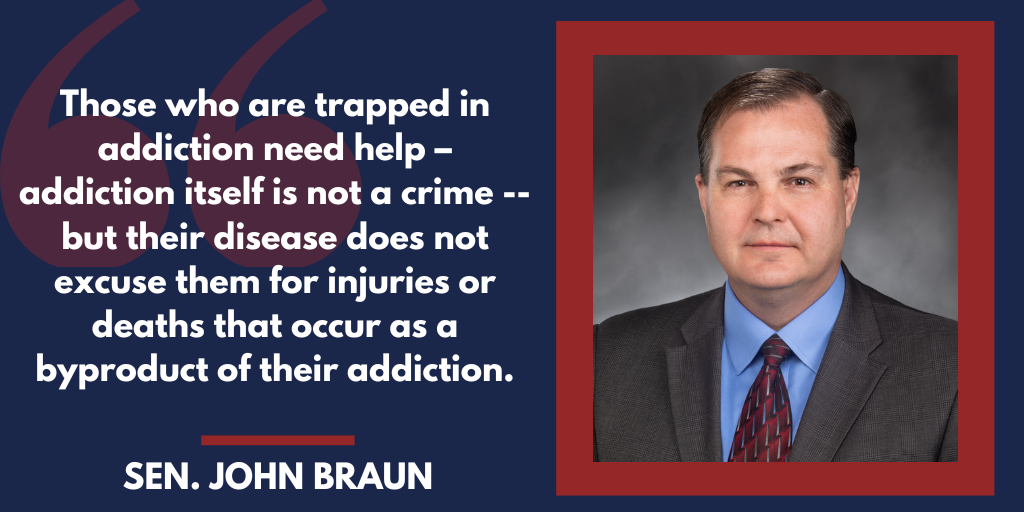
Video
Podcast
Audio
AUDIO: A state senator is mystified by a cut in drug task force funding. Tracy Ellis explains.
SRC On Air: Sen. John Braun talks to Lars Larson about a bill blocked by House Democrats that would make it a crime to knowingly expose a child to fentanyl, rent control legislation, and a measure that could severely restrict access to natural gas.
AUDIO: A pair of bills that target the fast-rising rate of opioid addiction and overdose deaths passed this week in the state Senate. Tracy Ellis reports.
AUDIO: As the drug overdose crisis continues in Washington, a bill to help people understand the growing danger of illegal drugs is moving forward in the state legislature. Tracy Ellis explains.
AUDIO: An effort to protect children from being harmed by fentanyl sailed through the state Senate again. Tracy Ellis reports.






